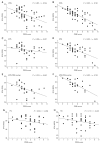Impact of sleep disorders, quality of life and gastric emptying in distinct subtypes of functional dyspepsia in Japan
- PMID: 24466451
- PMCID: PMC3895596
- DOI: 10.5056/jnm.2014.20.1.104
Impact of sleep disorders, quality of life and gastric emptying in distinct subtypes of functional dyspepsia in Japan
Abstract
Background/aims: The association between clinical symptoms, gastric emptying, quality of life and sleep disorders in distinct functional dyspepsia (FD) patients has not been studied yet in detail.
Methods: We enrolled 79 FD patients (postprandial distress syndrome [PDS], n = 65; epigastric pain syndrome [EPS], n = 47; EPS-PDS overlap, n = 33) and 44 healthy volunteers. Gastric motility was evaluated. We used Rome III criteria to evaluate clinical symptoms and State-Trait Anxiety Inventory (STAI) scores to determine anxiety status. Sleep disorder was evaluated using the Pittsburgh Sleep Quality Index scores.
Results: There were no significant differences in age, sex and Helicobacter pylori positivity between FD subtypes and healthy volunteers. The scores of Glasgow dyspepsia severity scores (GDSS), SF-8 and Pittsburgh Sleep Quality Index (PSQI) in distinct subtypes of FD patients were significantly different from those in healthy volunteers. However, there were not significant differences in these scores, Tmax and T1/2 among 3 subtypes of FD patients. PSQI score was significantly (P = 0.027, P = 0.002 and P = 0.039, respectively) associated with GDSS among EPS, PDS and EPS-PDS overlap patients. In addition, 8-item short form health survey (SF-8; Physical Component Score and Mental Component Score) was significantly associated with global PSQI score in PDS and EPS-PDS overlap patients. In contrast, SF-8 (Mental Component Score) only was significantly linked to global PSQI score in EPS patients.
Conclusions: Prevalences for sleep disorders, gastric motility and quality of life in 3 subtypes of FD patients were similar levels. In PDS and EPS-PDS overlap patients, SF-8 was significantly associated with global PSQI score.
Keywords: Dyspepsia; Functional gastrointestinal disorders; Sleep disorders.
Conflict of interest statement
Conflicts of interest: None.
Figures


References
-
- Tack J, Talley NJ, Camilleri M, et al. Functional gastroduodenal disorders. Gastroenterology. 2006;130:1466–1479. - PubMed
-
- Quigley EM. Gastric emptying in functional gastrointestinal disorders. Aliment Pharmacol Ther. 2004;20(suppl 7):56–60. - PubMed
-
- Shindo T, Futagami S, Hiratsuka T, et al. Comparison of gastric emptying and plasma ghrelin levels in patients with functional dyspepsia and non-erosive reflux disease. Digestion. 2009;79:65–72. - PubMed
-
- Futagami S, Yamawaki H, Izumi N, et al. Impact of sleep disorders in Japanese patients with functional dyspepsia (FD): nizatidine improves clinical symptoms, gastric emptying and sleep disorders in FD patients. J Gastroenterol Hepatol. 2013;28:1314–1320. - PubMed
LinkOut - more resources
Full Text Sources
Other Literature Sources
Miscellaneous

